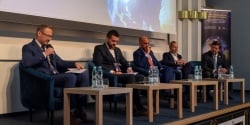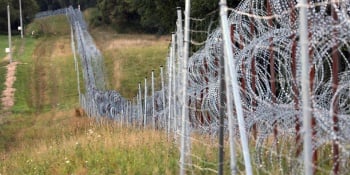Published: 20.09.2024

• European Union institutions are continuing their work on reforming the bloc’s treaties.
• If pushed through, the planned changes will lead to a far-reaching reduction in the sovereignty of the EU member countries.
• This was the central topic of an international conference organized in Warsaw on September 19 entitled “On the Threshold of the State of Europe. Economy, Defense, Ideology and the Protection of Sovereignty in a Transatlantic Perspective.”
• The conference was organized by Poland’s Ordo Iuris Institute in cooperation with The Heritage Foundation, a leading think-tank in the United States and one of the most influential centers of conservative thought in the world.
• The conference was attended by politicians, academics, social activists and journalists from Poland, Spain, France, Great Britain, Italy, Bulgaria, Slovakia, Romania, Hungary, Croatia, and the US.
• The participants in the discussion panels addressed issues such as climate policy, transatlantic economic cooperation, security and defense, the dangers of introducing gender ideology into social policy, and how to build international relations while respecting national sovereignty.
• The conference took place at the headquarters of the Association of Polish Journalists in Warsaw.
• After the conference, its participants met to discuss the draft amendment of the European Union treaties that was passed by the European Parliament last fall. They also decided to undertake joint activities to inform the public in all the EU member states concerning the planned changes.
The reform of the EU treaties that is underway is moving in the direction of significantly depleting the powers of the bloc’s individual states in key areas such as defense, social policy, health care, climate policy, and the economy. A major step in this direction was the European Parliament’s November 2023 resolution on the proposed treaty changes. Earlier this year, this issue was the focus of a special Ordo Iuris report entitled Why Do We Need Sovereignty? Ten Areas of the Surrender of National Sovereignty in Light of the European Parliament’s Resolution on Proposals for the Amending of the Treaties.
These potential changes in the EU were discussed by the participants in the Ordo Iuris and Heritage Foundation’s joint conference, both from European and American perspectives. The event was opened by Jerzy Kwaśniewski, the President of the Ordo Iuris Institute, and James Carafano, Senior Counselor to the President and E.W. Richardson Fellow at The Heritage Foundation. Kwaśniewski noted that work on treaty reform has not received much attention in the European Union, even though, as he pointed out, the European nation-states are just one step away from throwing out most of their own independent decision-making powers. Carafano spoke about the ongoing electoral battle in the United States, which will no doubt have an impact on what happens in Europe as well. As he stressed, however, regardless of the outcome of the upcoming presidential and Congressional elections in the US, he believes that relations and cooperation between conservative circles on both sides of the Atlantic will only strengthen.
U.S. and EU climate and regulatory policies and transatlantic competitiveness in the global economy
The conference’s first panel focused on US and EU climate policy as well as transatlantic competitiveness in the global economy. It was attended by Joe Grogan, the former director of the US Domestic Policy Council and assistant to President Donald Trump; Frenchman Raphaël Audouard, director of the Patriots for Europe Foundation, which is behind the Patriots for Europe group in the European Parliament; Ricardo Ruiz de la Serna, the director of studies and training at the Disenso Foundation in Spain; and Confederation MP Krzysztof Muława, Vice Chairman of the Committee on Energy, Climate, and State Assets in the Polish Sejm. Their discussion was moderated by Ellen Kryger Fantini, an American journalist living in Europe who is also the managing editor of The European Conservative magazine and website.
The panelists discussed, among other things, the EU Green Deal. Ruiz de la Serna noted that this new climate policy places a huge burden on Spanish farmers, and many small entrepreneurs have had to close their businesses as a result. Mulawa stressed that the EU, through the Green Deal, does not take into account the differences in, for example, the speed of development across individual countries and their different approaches to industry. Grogan pointed out that the best illustration of how misguided the Biden administration and the European Union’s climate policies are is that during Donald Trump’s presidency, while hydrocarbon production and sales grew rapidly in the United States, greenhouse gas emissions simultaneously fell to levels not seen since the late 1960s. Raphaël Audouard, on the other hand, stressed the fact that the European Union’s climate policy is primarily a “trick” to allow Brussels to seize new powers rather than a means of fostering genuine environmental protection.
What does the establishment of the European Defence Union mean for the future of NATO and security?
The participants in the second panel, for their part, tried to answer the question of what the future development of the European Defense Union means for the future of NATO as well as transatlantic security and defense cooperation more generally. The panelists included James Carafano of the Heritage Foundation; Romanian parliamentarian Ben-Oni Ardelean, a member of the Romanian Parliament’s Foreign Affairs Committee; the Polish columnist and essayist Kacper Kita; as well as Fabio Gallì of the influential Italian think tank Nazione Futura. The panel was moderated from a British perspective by Sherelle Jacobs, who is a journalist and columnist writing for The Telegraph. Carafano stressed that there can be no talk of European security without a transatlantic dimension to it, and that NATO is an alliance of equals, regardless of its members’ sizes. He also noted that the security of the transatlantic community will “99 percent” depend on what Poland does in terms of armaments, because if there is a strong Polish army as well as a strong Ukrainian army, then Russia will not have the opportunity to attack the countries of the Atlantic alliance regardless of whether Ukraine is eventually admitted into NATO or not. Kita pointed out the crucial importance of preserving the capabilities of the sovereign states in the field of defense. It is important that we preserve our own sovereignty and power in terms of defense, he stressed, because what ultimately counts is the ability to defend your own country. Ardelean expressed the view that the project to build a common European defense is in fact directed against transatlantic cooperation and threatens peace in Europe. Galli added that since the countries that make up the European Union are different states with often diverging interests, it is impossible for them to have one common army, despite what the authors of the draft amendments to the European Union treaties would like.
The dangers of developing gender ideology in U.S. and UE social policy
Another panel focused on the impact of gender ideology on societies on both sides of the Atlantic. The moderator of the discussion, Rafał Dorosinski, a lawyer who sits on the board of the Ordo Iuris Institute, noted that the “woke” movement is aggressively attacking the basic values of Western civilization, first and foremost reason and logic. The participants in the discussion included Marek Novák, international director at the Ladislav Hanus Institute in Slovakia; Ed Martin from the US, who is the President of Phyllis Schlafly Eagles and a member of the platform committee of the Republican National Convention; Rodrigo Ballester, a lawyer by training who is the head of the Center for European Studies at the Mathias Corvinus Collegium in Budapest and a former senior official of the European Commission; and Frank Furedi, a renowned British sociologist of Hungarian origin and a former professor at the University of Kent. Novák stressed that any conservative narrative at present is being treated as extreme and hence is being marginalized in the public debate. Furedi, on the other hand, believes that the cultural elites of European society are destroying the very foundations of humanity and the basic principles of human life, namely the biological distinction between man and woman. Martin explained how the development of gender ideology in the United States is leading to increasing restrictions on parental rights and civil liberties. The struggle for human rights, which began as a constitutional struggle, then unfortunately grew into a broader cultural war that is still ongoing, the American politician noted. Then Ballester demonstrated, using various specific examples, how Brussels uses its budget as a financial weapon in order to combat all the opponents of its ideology, thus grossly exceeding the powers that have in fact been granted to the European Union.
The limits of sovereignty in a global world. How to build multilateral international relations?
The last panel was devoted to sovereignty and international relations. Its participants were Georgi Harizanov of the Institute of Right-Wing Politics in Bulgaria; Istvan Stumpf, a member of the Strategic Advisory Council to the Prime Minister of Hungary; Henri Malosse of France, a former President of the European Economic and Social Committee and current chairman of the Jean Monnet Association; Daniele Scalea, President of the Machiavelli Center for Political and Strategic Studies in Italy; and Magor Ernyei, international director at the Center for Fundamental Rights in Hungary. The debate was moderated by Jerzy Kwaśniewski of Ordo Iuris. Stumpf pointed out the manipulative use of the EU’s rules by European institutions. Brussels has no respect for treaties and values, and abides by the rules only insofar as they serve federalist ambitions, he said. Malosse admitted that if Jean Monnet, who was one of the founding fathers of the European Community, could see how the European Union looks and works today, he would be greatly surprised and would not recognize his own project in it. Scalea then underscored the impact that the treaty reforms would have on migration policy. He pointed out that if foreign policy becomes the exclusive purview of the EU, it will definitely be to the detriment of the member states, including when it comes to the issue of migration. He was echoed by Ernyi, who added that European institutions should help, rather than hinder, those member countries that oppose illegal immigration. On the other hand, as Harizanov pointed out, the strength of the international community depends on the sovereignty of individual countries, and the strength of the EU depends on that of each of its member states.
Acting together
Following the conference, all the participants of the four discussion panels met and discussed this project for extensive centralization of the European Union, which is being carried out, in great part, through deception by the EU’s elites with the support of the German and French governments. First and foremost, they acknowledged that, in order to counter this dangerous project, the planned treaty changes should, rather sooner than later, become a subject of open public debate in all the EU member states. This is why the participants of the Warsaw conference discussed a strategy on how to make this happen and, as a result of over two hours of discussion, some preliminary decisions were made concerning which joint activities should be undertaken first.
Photos: Tomasz Daniluk/Ordo Iuris

• The pressure on the European Union’s southern borders has continued unabated since the great migration crisis of 2015.

23.05.2025
We are currently engaging with think tanks and political parties across the continent to collaboratively develop a detailed counter-proposal to the centralist, anti-national, and anti-democratic vision of the European Union promoted by the European Parliament and President Macron.

19.05.2025
• The 78th World Health Assembly, the deliberative body of the World Health Organization, begins today in Geneva.

16.05.2025
On 13 May 2025, James Daniel Jordan, Chairman of the Judiciary Committee of the United States House of Representatives, together with four other members of the Committee, addressed a letter to Michael McGrath, European Commissioner for democracy, justice and the rule of law. The letter inquires how the European Union intends to respond to the actions of Donald Tusk’s government.